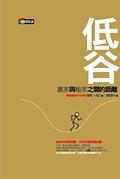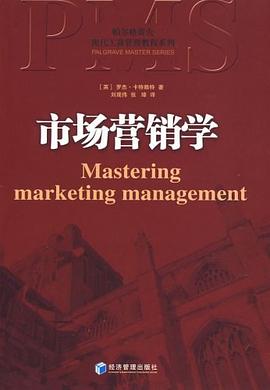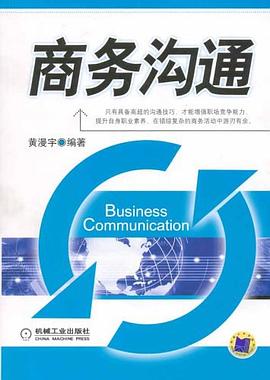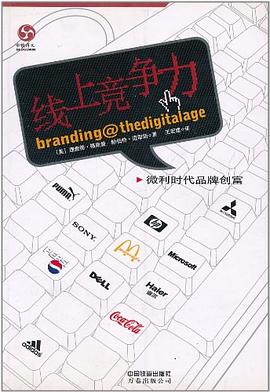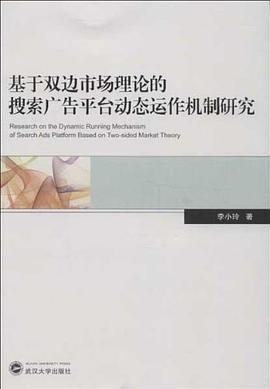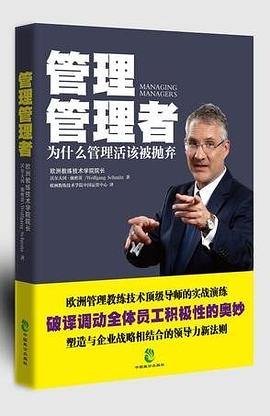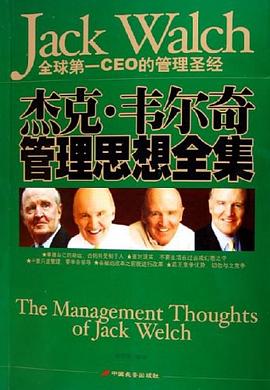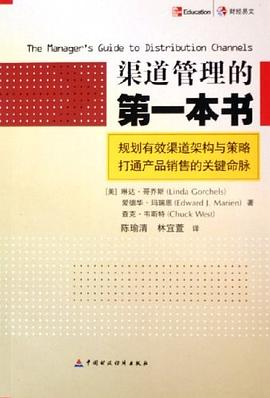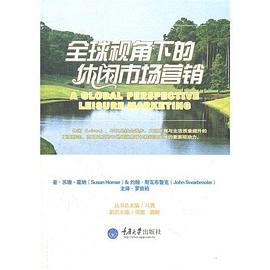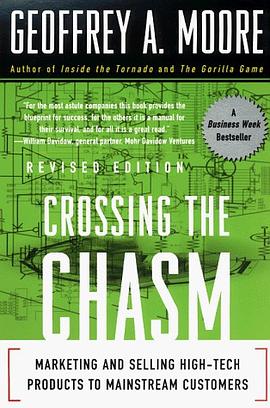

具体描述
Author Geoffrey Moore makes the case that high-tech products require marketing strategies that differ from those in other industries. His chasm theory describes how high-tech products initially sell well, mainly to a technically literate customer base, but then hit a lull as marketing professionals try to cross the chasm to mainstream buyers. This pattern, says Moore, is unique to the high-tech industry.
Moore suggests remedies for the problem that can help businesses meet their long-term goals. He coaches marketing professionals on how to move slowly through the gulf, teaching them to create profiles and target specific segments of the population rather than trying to plow right into the mainstream. He cites examples of successful chasm crossings by such companies as Apple, Tandem, Oracle, and Sun, showing what they all had in common and exposing the different weaknesses in their strategies. Moore also assigns responsibility for success to programmers and developers by suggesting they design a "whole product model." Here, because integration tasks are daunting to the mainstream market, all the components of a technological product must be in one package. Moore also describes strategies for competing with rival companies and assessing the best distribution channels for penetrating the target market.
Written not just for marketing specialists but for all employees whose futures ride on the success of a technical product, Crossing the Chasm delivers crucial information in an engaging, readable tone. --This text refers to an out of print or unavailable edition of this title.
作者简介
Geoffrey Moore is a Managing Director with The Chasm Group, a consulting practice based in California that provides market development and business strategy services to many leading high-technology companies. He is also a Venture Partner with Mohr Davidow Ventures, a California-based venture capital firm specializing in specific technology markets, including e-commerce, internet, enterprise software, networking and semiconductors. As a Venture Partner at Mohr Davidow, he provides market strategy advice to their high-tech portfolio companies. Geoffrey is a frequent speaker and lecturer at industry conferences and his books are required reading at Stanford, Harvard, MIT and other leading business schools.
Geoffrey's current practice focuses on the concepts of his recent book Living on the Fault Line, targeted to CEO's and senior executives of Fortune 500 companies facing the impact of the Internet. Geoffrey's first book, Crossing the Chasm, initially published in 1991, adds compelling new extensions to the classical model of the Technology Adoption Life Cycle. He introduces his readers to a gap or ""chasm"" that innovative companies and their products must cross in order to reach the lucrative mainstream market. A revised edition was released in July 1999 to update industries and case-study companies.
The sequel, Inside the Tornado, published in 1995, provides readers with insight into how to capitalize on the potential for hypergrowth beyond the chasm. This second book sorts out how the market forces behind the Technology Adoption Life Cycle demand the need for radical shifts in market strategy.
The Gorilla Game, Geoffrey's third book, was originally released in March of 1998 with a revised version, including a new chapter on internet investing, released August of this year. This book was co-authored with Chasm Group managing partner and high-tech marketing strategist Tom Kippola, and stock investment guru and BancAmerica Robertson Stephens analyst Paul Johnson. The Gorilla Game combines the methodology Moore introduced in Crossing the Chasm and Inside the Tornado, with Johnson's stockmarket valuation models and Wall Street expertise, and Kippola's high-tech investment experience.
Geoffrey's most recent book, Living on the Fault Line, focuses on a single theme: How should the management of a public company that rose to prominence prior to the age of the Internet manage for shareholder value now that the Internet is upon us? Living on the Fault Line guides executives and managers who are coping with disruptive technology, destabilizing their core market positions, providing them with new models, metrics, and organizational practices to meet the challenges of the new economy.
Prior to founding The Chasm Group in 1992, Geoffrey was a principal and partner at Regis McKenna, Inc., a leading high-tech marketing strategy and marketing communications company. For the decade prior, he was a sales and marketing executive at three different software companies.
Geoffrey holds a bachelor's degree from Stanford University and a Ph.D. from the University of Washington, both in literature, and served as an English professor at Olivet College.
目录信息
读后感
读这本书纯粹是出于装B/偶然,买到手以后放了几天,实在不想读 后来没办法,没别的书读了就拿起来读,没想到读得听有意思…… 印象最深的几点: 全书用诺曼底D-Day来作例子,非常形象,很容易理解 1. 集中力量于细分市场(niche market),做好产品的定位,而非四处撒网。然后...
评分the author is trying to identify the different marketing strategy for high-tech companies and ordinary companies. he points out the unique phenomenon of high tech products marketing, which requires crossing the chasm between earlier cooler adaper with bigg...
评分这书的封面上印着“颠覆性产品营销圣经”,并不是夸大其辞,即使算不上圣经,这也可以乘坐一本颠覆性产品在茫茫未知世界中的生存手册。 如同前面的评论,书的内容安排非常逻辑化,模型简单实用,惟其简单才让人印象深刻,技术采用生命周期的五个群体:创新者、早期采用者、早...
评分读这本书纯粹是出于装B/偶然,买到手以后放了几天,实在不想读 后来没办法,没别的书读了就拿起来读,没想到读得听有意思…… 印象最深的几点: 全书用诺曼底D-Day来作例子,非常形象,很容易理解 1. 集中力量于细分市场(niche market),做好产品的定位,而非四处撒网。然后...
评分那位豆油家里闲置此书,可以转让给我嘛,急需呀,多谢啦 那位豆油家里闲置此书,可以转让给我嘛,急需呀,多谢啦 那位豆油家里闲置此书,可以转让给我嘛,急需呀,多谢啦 那位豆油家里闲置此书,可以转让给我嘛,急需呀,多谢啦 那位豆油家里闲置此书,可以转让给我嘛,急...
用户评价
我必须得说,这本书的语言风格简直是教科书级别的范本,充满了力量感和一种近乎冷峻的精准度。作者似乎有一种魔力,能用最简洁的词汇,勾勒出最复杂的情感图景。很多段落,我需要反复阅读才能完全消化其中的深层含义,这倒不是因为文字晦涩,而是因为信息密度太高,每一个动词和形容词都像是经过了千锤百炼,毫不冗余。尤其是那些描述内心挣扎和决策瞬间的场景,那种紧张到令人窒息的氛围,是通过精妙的句式结构和强烈的对比手法营造出来的。例如,当角色面临重大的道德抉择时,作者会立刻切换到一种近乎旁观者的、冷静的视角来叙述,这种反差极大地增强了戏剧张力。此外,书中对一些技术性或专业性的描述,虽然篇幅不长,但其严谨性也令人印象深刻,足见作者在前期调研上下了苦功。这本书读下来,感觉不仅仅是在看一个故事,更像是在接受一场高强度的智力训练,每一次阅读都是对语言艺术的再次膜拜。
评分这本书最让我感到惊喜的是其人物塑造的立体感。这里的角色都不是脸谱化的符号,他们都有着自身难以磨灭的缺陷和可贵的闪光点。即便是看似反派的角色,作者也并未简单地将其脸谱化为纯粹的邪恶,而是通过大量的内心独白和侧面烘托,揭示了他们行为背后的逻辑和动机,让你在痛恨之余,又会对其处境产生一丝怜悯。而主角群体的成长弧线,更是处理得高明。他们不是一帆风顺的英雄,他们的胜利往往伴随着巨大的牺牲和痛苦的教训。我特别喜欢作者处理“失败”的方式,失败在这里不是故事的终结,而是通往更高层次理解的必经之路。每一次跌倒,都能看到他们从尘土中站起来时,眼神中那种更加坚毅和成熟的光芒。这种对人性复杂性的深刻洞察和坦诚描绘,使得整个故事充满了人性的温度和重量,远超一般的商业小说所能达到的深度。
评分从结构布局来看,这本书的宏大叙事与微观叙事之间的切换处理得极其巧妙。故事的主线无疑是波澜壮阔的,关乎某个宏伟目标或变革的实现,它需要大量的背景铺陈和时间跨度。然而,作者没有让主线变得空洞或过于抽象,而是不断地通过聚焦于几个关键人物的个人视角,将宏大的主题落实到具体的、可触摸的情感体验上。这种处理方式,使得读者在跟进复杂情节的同时,始终能够锚定在具体的情感支点上。比如,一个重要的战略会议可能会被穿插进主角回家探望老友的一个短暂场景中,通过老友对当前局势的朴素看法,反而为复杂的战略提供了一个全新的、接地气的解读。这种交织并进的叙事手法,极大地丰富了文本的层次感,让读者在享受史诗感的同时,也体会到了人生的细碎与真实,保证了阅读体验的持续新鲜感和吸引力。
评分这本书在主题表达上,展现出一种极其罕见且成熟的辩证思维。它并没有给出一个简单的、非黑即白的答案,而是勇敢地探讨了许多灰色地带的困境。例如,书中关于“创新与保守”之间的张力,被描绘得淋漓尽致,没有一方被完全否定,而是凸显了在特定条件下,两者如何相互制约又相互成就。我尤其欣赏作者在处理“成功代价”时的坦诚。它没有浪漫化那种突破难关的过程,而是毫不留情地揭示了为此付出的隐性成本——那些被忽略的友谊、错失的亲情,以及自我认知的重塑。这种对现实的清醒认知,使得故事的力量感倍增。读完之后,我没有得到一个轻松的结论,反而陷入了更深层次的思考:真正的进步,是否必然要求某种程度的自我牺牲?这本书的价值就在于,它提出了足够深刻的问题,并且用精彩的故事作为载体,引导读者自己去寻找那些难以捉摸的答案。
评分这本书的叙事节奏把握得非常到位,开头并没有急于抛出核心冲突,而是花费了大量的笔墨去描绘主人公所处的那个特定时代背景和社会环境。那种压抑、渴望突破的氛围,通过细腻的环境描写和人物的日常互动,被刻画得淋漓尽致。我尤其欣赏作者对细节的捕捉,比如那些不经意间流露出的时代烙印,无论是街角的招牌文字,还是人物之间的对话习惯,都让人感觉身临其境。主角的心理转变过程,也显得非常真实可信,从最初的迷茫和自我怀疑,到逐渐找到方向并坚定信念,每一步的挣扎与成长都牵动着读者的心弦。这种循序渐进的铺陈,为后文的高潮部分积蓄了强大的情感张力。而且,书中穿插的一些哲思片段,虽然没有直接点明主旨,却像夜空中的星辰一样,为整个故事增添了一层深邃的意境,让人在阅读故事的同时,也进行着某种程度的自我反思。总的来说,这是一部需要静下心来细品的佳作,它不仅仅讲述了一个故事,更像是一次对特定历史侧面的深度挖掘。
评分The key to retain a smooth profit during product life cycle is knowing and obtaining different needs for different groups. It remains unclear though whether it works for China where there is few company that is a technology leader.
评分The key to retain a smooth profit during product life cycle is knowing and obtaining different needs for different groups. It remains unclear though whether it works for China where there is few company that is a technology leader.
评分The key to retain a smooth profit during product life cycle is knowing and obtaining different needs for different groups. It remains unclear though whether it works for China where there is few company that is a technology leader.
评分The key to retain a smooth profit during product life cycle is knowing and obtaining different needs for different groups. It remains unclear though whether it works for China where there is few company that is a technology leader.
评分The key to retain a smooth profit during product life cycle is knowing and obtaining different needs for different groups. It remains unclear though whether it works for China where there is few company that is a technology leader.
相关图书
本站所有内容均为互联网搜索引擎提供的公开搜索信息,本站不存储任何数据与内容,任何内容与数据均与本站无关,如有需要请联系相关搜索引擎包括但不限于百度,google,bing,sogou 等
© 2026 book.wenda123.org All Rights Reserved. 图书目录大全 版权所有

